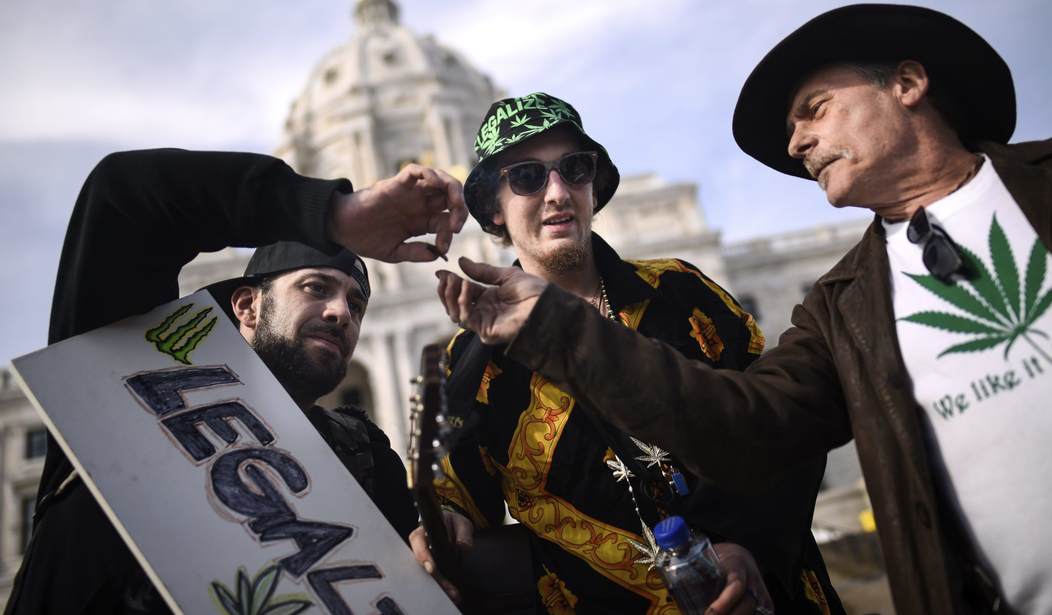Forget about whether the Democrats’ November election victories amounted to a Blue Wave or a puddle. The real winner was green: marijuana. So proclaimed Tom Angell, the longtime editor of the pro-weed website Marijuana Moment, in Forbes.
It was more than the approval of marijuana legalization ballot proposals in Michigan, Missouri and Utah (along with several Ohio cities where voters passed marijuana decriminalization measures) that excited Angell.
He was happiest about a wave of pro-pot Democratic governors.
Angell rejoiced to see that New York Gov. Mario Cuomo, who has consistently opposed legalizing recreational marijuana, was now willing to look at draft pro-legalization proposals in 2019.
Wisconsin Gov.-Elect Tony Evers, Angell noted, supports decriminalizing marijuana, allowing the use of medical cannabis, and putting a proposal to legalize recreational pot before voters.
He also pointed to victories of Democratic gubernatorial candidates like Illinois Gov.-elect J.B. Pritzker and Minnesota’s next governor, Tim Walz.
Indeed, Minnesota could be the next state where people will be able to enjoy cannabis buds without looking over their shoulders for the law.
“If you’re looking for a sleeper issue, this could be it,” said Larry Jacobs, director of the University of Minnesota’s Center for the Study of Politics and Governance. “It’s not going to be the top priority. But I think it could be one of those things that kind of sneaks through.”
Walz made no secret of his support for legalization of marijuana during his victorious gubernatorial campaign and once called it a “Pot for Potholes” platform.
“Let’s make sure it’s (marijuana) regulated,” Walz said. “Let’s make sure people use it in a responsible manner and the state benefits.”
Now that it’s clear his voice will soon matter even more as the governor of Minnesota, Walz told the Pioneer Press, “I just think the time is here (for legalization), and we’re seeing it across the country.”
“Minnesota has always been able to implement these things right,” Walz added.
Ironically, Walz believes legalizing the drug will bring new money into state coffers to pay for programs to fight substance abuse addiction and educate kids about the evils of drugs.
He also likes the idea of wiping clean the slates of convicted marijuana users.
“I think that’s an important component of this,” Walz said. “Give people the opportunity to get out, start fresh and realize that society has moved and changed on this issue and we can get it right.”
However, not all Democrats are as enthusiastic as Walz about marijuana legalization.
State Rep. Melissa Hortman, the Democrat who will be speaker of the Minnesota House next year, said she was willing to look at legalization, but stopped short of a full-throated endorsement.
But it isn’t entirely up to the Dems. Republicans will have something to say, too. And the Minnesota Legislature will be split between the two parties in 2019.
Republican Senate Majority Leader Paul Gazelka said he wants the issue to be studied and debated before the legislature votes.
“My gut is that it’s probably not good for the state, but that’s what we’re going to find out,” Gazelka said.
Republican Rep. Brian Johnson, a former cop, said his mind is made up. Minnesota, he believes, should never legalize weed.
“I don’t think it’s good for Minnesota at all,” Johnson said. “Like all drugs, abuse of it can cause mental health issues.”
Chris Wright of the Grassroots-Legalize Cannabis Party admitted to WCCO-TV in Minneapolis that supporters of legal weed were at “a little bit of an impasse” with GOP lawmakers.
“We’re hoping our Republican friends will come around on the issue,” Wright said, “and see this as a way to raise revenue.”
Minnesota state Rep. Alice Hausman (D) proposed legalizing marijuana last winter, but Republicans then controlled both chambers of the legislature. She’s hoping 2019 will be different, now that Democrats hold sway in the House. But still, Hausman said, legalizing weed isn’t going to be easy.
She said the priority has to be crafting a single, common proposal that will satisfy a wide swath of proponents, but at the same time will result in a concerted push for legalization.
Right now, people who want to legalize cannabis in Minnesota can’t agree on how to do it. For instance, leaders of the Campaign for Full Legalization worry about opposition to smoking pot because many cities are raising the legal smoking age for tobacco to 21.
The National Organization for the Reform of Marijuana Laws, according to City Pages, wants a purchasing age of 18 written into any proposal, arguing that if one is old enough to die in war, one is old enough to get a marijuana buzz.
Other activists want to make sure local, small pot operations are protected from giant, corporate marijuana operations, while others don’t want Republicans involved in the proposal-writing process.
“If everyone is coming asking for something different, you may get nothing because legislators then are too confused,” Hausman said. “The advocacy community somehow needs to get together and get around the table and agree on a single bill. That would be my first hope, and that’s their work to do.”
No matter what stumbling blocks might be in the way of full marijuana legalization in Minnesota, Tom Angell wrote he’s confident that the federal prohibition of pot will be erased after the 2020 elections, if not before.
“A number of likely 2020 Democratic presidential candidates have embraced cannabis legalization,” Angell wrote, “setting up an uncertain situation where the issue could potentially be viewed through a partisan lens or perhaps emerge as a rare area where the two major parties can work together to achieve a popularly supported goal.”









Join the conversation as a VIP Member